Does hiking keep you fit? Oh yes. I discovered hiking fairly late into adulthood, and it’s by far my favourite endurance exercise to stay fit. By the end of this article, I hope you’ll love hiking as much as I do!
Part 1 will cover why you should seriously consider hiking as a staple in your fitness routine.
Part 2 will take you through my 2018 (at age 37) Ten Y Fan 40-mile ultra-endurance challenge, and 2023’s partially complete (for reasons beyond my control, which you’ll read about) follow-up. You’ll also get an insight into my training programme as a busy dad and the actual event. As they say, to be continued…
In my usual detailed style, I want to fully immerse you into the world of hiking for fitness and walk (excuse the pun) you through my own experiences. Together, we’ll explore why hiking should become a strong part of your own training routine. We’ll cover the following topics in-depth:
Top 8 FAQs About Hiking and Fitness
1. Does hiking actually keep you fit?
Absolutely. Hiking is an excellent full-body workout that combines cardiovascular exercise with strength-building. It engages your legs, core, and stabilising muscles while improving heart health, endurance, and overall fitness.
2. How many calories can you burn while hiking?
Calorie burn depends on factors like weight, terrain, and intensity. On average, a person weighing 70kg (154 lbs) burns 300-400 calories per hour on moderate terrain, with steeper climbs pushing that number even higher.
3. Is hiking better than running for fitness?
It depends on your goals. Hiking is lower impact, making it gentler on the joints, and works more muscles due to uneven terrain. Running may burn more calories in less time, but hiking offers a sustainable, long-term way to improve both fitness and mental health.
4. Do I need special gear to start hiking?
Not for beginner-friendly trails. Comfortable walking shoes, water, and weather-appropriate clothing are enough for shorter hikes. For longer or more challenging hikes, consider investing in hiking boots, layered clothing, and a backpack with essentials like food, water, and a torch.
5. Is hiking safe for beginners?
Yes, as long as you choose suitable trails and take basic precautions. Start with shorter, well-marked paths and gradually increase distance and difficulty as you build confidence. Always research your route, pack water, and let someone know where you’re going.
6. How does hiking compare to gym workouts?
Hiking provides a more varied, natural workout compared to repetitive gym exercises. It’s excellent for endurance, mental well-being, and functional strength, while the gym allows more control for targeting specific muscles or goals like heavy lifting.
7. Can hiking help with weight loss?
Yes. Hiking is a calorie-burning activity that also builds muscle, which boosts your metabolism. Combined with a balanced diet, it’s an effective way to shed fat and improve body composition.
8. How often should I hike for fitness?
Start with one hike per week, gradually increasing frequency and distance as your fitness improves. Even hiking once a week can provide noticeable benefits, but for optimal results, aim for 2-3 hikes weekly.
What is Hiking?
So, what is hiking? It’s easy to assume we know, but the full definition often eludes us. Hiking involves walking in natural environments, typically on trails or pathways. It can range from a leisurely stroll to a full-blown, strenuous multi-day climb up a steep mountain route.
Hiking is synonymous with experiencing the awe of nature, fresh air, beautiful landscapes, and a sense of tranquillity. For those who love hiking, the journey is just as important as the destination.
Unlike many fitness endeavours, the entry level to hiking is gentle, and it can scale to meet even epic fitness goals. Hiking welcomes all fitness levels and ages, making it a versatile exercise.
Random hiking fact: The oldest long-distance trail is the Appalachian Trail in the US. It stretches 2,190 miles from Georgia to Maine, passing through 14 states. It was completed in 1937. Give it a go if you can!
Why I Chose Hiking: Does Hiking Keep You Fit?
“Why would I want to hike when I can run?” That was the polite, internal question I asked when a well-meaning friend first suggested hiking to me. My question, I soon realised, was illogical. Logic and I often take a while to get acquainted, especially when it comes to trying something new.
I’ve never been a “marathon man,” but I’ve always enjoyed running and sprinting as part of my cardio routine alongside weightlifting. Incline treadmill sprints, hilly five-mile runs, and longer weekend runs were staples in my fitness regime. I used to think running was the best way to stay fit, but I quickly found out does hiking keep you fit too? Absolutely!
I was lucky to avoid training-related injuries for most of my fitness journey—until 2015, when runner’s knee made its unwelcome debut.
A few weeks after my friend’s ridiculous suggestion to try hiking, my wife and two-year-old son went away with extended family for a long weekend. Unfortunately, I was tied up with work commitments and couldn’t join them.
One fine Saturday morning, after finishing my weekly strength training, boredom started to creep in. Faced with a life-changing decision—watch another boxset or weed the garden—I surprisingly chose neither. Instead, I decided to go for a hike.
Living in a hilly, scenic part of the world, I’m fortunate to have a variety of challenging hiking trails to choose from. Armed with just a bottle of water, I set off on my first hike.
I walked for hours, scrambled through bracken, got lost more than once, and eventually found my bearings. I vividly remember panting hard as I stood on the peak of a local mountain, in awe of my surroundings. From that moment on, I was hooked and started to love hiking.
Since that Saturday walk, hiking has become a key part of my fitness routine. My weekly hike has significantly contributed to my overall fitness and provided countless special memories along the way. I’m convinced that hiking can do the same for you!
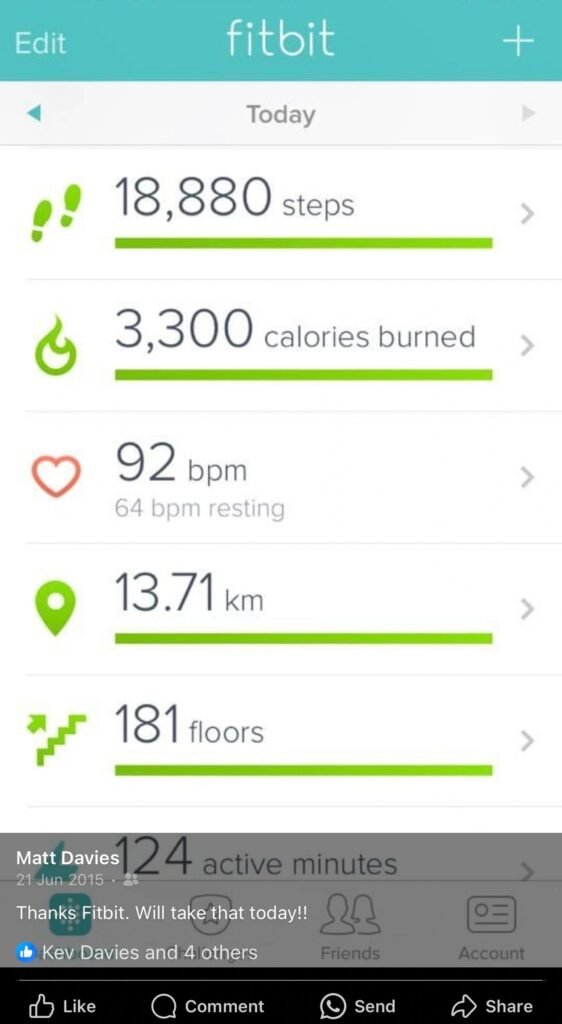
The Benefits of Hiking
When considering does hiking keep you fit, the answer becomes clear when you look at the numerous hiking fitness benefits. Whether you hike 400 metres or 13 miles, you’ll notice improvements in several key areas, including:
- Strengthened muscles, especially those associated with endurance activities
- Cardiovascular system enhancements
- Increased lung capacity
- Building endurance and overall work capacity
- Improved balance and coordination from navigating uneven terrain
- Bone density gains from weight-bearing exercise
Hiking can significantly improve cardiovascular health. According to the American Heart Association, regular physical activity, like hiking, can reduce the risk of heart disease by up to 50% and improve blood pressure
At first, I was sceptical and somewhat dismissive of the fitness benefits of hiking. I was wholeheartedly wrong.
Mental Benefits of Hiking: Why You’ll Love Hiking
The mental benefits of hiking are equally profound. You know by now that I’m a gym junkie and always will be, but there’s something about hiking and being immersed in nature that the gym simply can’t provide:
- A sense of accomplishment after completing a difficult route or event
- The rhythmic pace and natural surroundings often create a meditative experience that rejuvenates even the most stressed mind and spirit
- Enhanced creativity and problem-solving abilities. Whether it’s a professional challenge or a personal issue, being out in nature allows me to think more clearly
- Exposure to natural light and a boost of essential vitamin D from the sunlight, something you miss out on in artificially lit environments
- The joy of discovering new places that you’ve never ventured to before
Spending time in nature can reduce stress and anxiety. A study published in Frontiers in Psychology showed that individuals who spent just 20 minutes in a natural environment had significantly lower cortisol levels, the hormone responsible for stress

Social Benefits of Hiking
You can gain social benefits from many sports and activities, but none are as versatile as hiking. In addition to the solo benefits of offering introspection, the following social benefits of hiking are yours to enjoy:
- Facebook is filled with hiking groups, ranging from casual to serious hikers.
- It’s easy to find someone with a similar experience level and shared fitness goals.
- It’s a fantastic activity to do with family. I’ve hiked with my wife and children at various ages—more on this below.
- Hiking doesn’t discriminate against age, and many safe routes exist to cater for all abilities.
- Sharing new locations as a group creates unique experiences and memories.
- Professional networking opportunities are plentiful. You’d be surprised at how tackling tough terrain together can strengthen both internal and external business relationships. In fact, hiking as a networking activity is surprisingly well-received! And let’s not forget the mandatory evening meal and stiff drinks that follow a long hike.
- If you have a four-legged friend, you’ll likely tire out before they do, no matter how long the hike.
The social benefits of hiking are plentiful, and you’re never more than a Facebook group away from finding someone to hike with. Whether you’re looking to connect with others or wondering does hiking keep you fit, this activity has you covered. You’ll soon find yourself saying you love hiking for both its fitness and social aspects.

Beginners Hiking Tips
Unless you’re planning for your first hike to include Everest base camp or scaling up vertical rock Cliffhanger style, the gear you’ll need is similar to most sports. However, whether you’re a beginner or seasoned hiker, does hiking keep you fit is a key question, and with the right approach, the answer is a resounding yes.
You can spend very little or a fortune on hiking gear, depending on the weather, route difficulty, and the duration of your hike—some expeditions can last for days. Below, we’ll cover equipment needed for your first low-duration/easy terrain hike, and for a longer, all-day hike in unfamiliar areas.
Remember my first official hike mentioned earlier? I set off with nothing but a bottle of water and the clothes on my back. It was June 2015, and the weather was perfect. The terrain was well signposted, and getting lost was purely down to my own decision to deviate off the path.
Whether you’re hiking a tough, unfamiliar route or keeping it local, always take time to prepare and plan your first hike. You can easily sustain a fall walking down a residential street, so don’t lull yourself into a false sense of security just because you’re close to home. Microclimates are real, especially at altitude. Shorts and T-shirt weather at your doorstep doesn’t mean the climate a few hundred feet higher will be the same.
Research shows that walking on uneven terrain can engage and strengthen stabilising muscles in the legs, hips, and core, reducing the risk of injury and improving balance over time,” says Dr. David Geier, orthopaedic surgeon and sports medicine specialist.
Hiking Safety Is Paramount: Love Hiking but Stay Safe
Before setting off on even the most well-researched and gentle rural walks, safety is key—no matter how much you love hiking. Your life could depend on following these safety tips:
- Research the weather before heading out. Late spring and summer are generally fine, but as mentioned earlier, even in the mildest climates, weather can surprise you.
- If you’re starting out, you’ll likely stick to routes that are familiar or well-known. Ensure you really know your route before setting off.
- Always pack essentials—don’t underestimate the need for basic safety gear, even on shorter hikes.
Beginners Hiking Equipment: Must-Haves for Your First Hike
You don’t need to spend a fortune on beginners hiking equipment, but I’d strongly recommend purchasing the following essentials. Safety always comes first.
- Hiking boots
Not only do they protect you from the elements, but they also provide comfort and grip. Investing in a good pair of boots minimises your chances of slipping on uneven terrain. I should have done this years earlier! - A fully charged mobile phone
Don’t take chances. You don’t want to be in an emergency situation with a dead phone. - Weather-appropriate clothing
Layering is key when dressing for hiking. It’s easy to dress for winter, but the tricky part is mild, unpredictable weather. A good rain jacket, T-shirt, long-sleeve top, and a sweater will allow you to adapt as conditions change. You’ll appreciate the extra layers the higher you climb. - Sufficient water
Don’t assume that because you’re only two hours from home you won’t need water. You’ll regret not packing a bottle if you’re out longer than anticipated. While you can survive without food for a while, water is essential. - A torch
Depending on lighting conditions, having a torch in your backpack is never a bad idea. - Respect nature
Don’t forget to take your rubbish with you. Protect the environment and dispose of your waste properly.
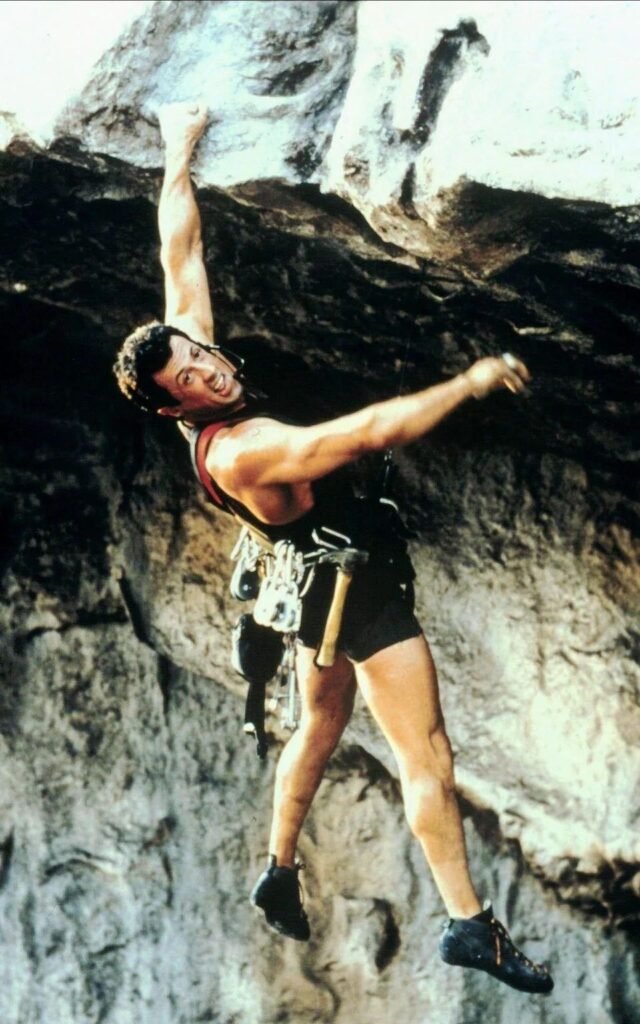
Advice for Challenging Hikes
While I’m far from being a multi-day Antarctic explorer, I’ve learned a lot from my experience with longer, all-day hikes and 24-hour endurance events. If you’re wondering does hiking keep you fit, challenging hikes certainly do! They test your endurance, stamina, and resilience, helping you to stay in top shape.
Once you reach the intermediate hiker level, you’ll likely want to travel further, climb higher, and explore more remote areas. While hiking fitness benefits are immense, safety becomes even more crucial during these tougher adventures.
I’ve experienced 20-degree heat at the base of a mountain, only to be caught off guard by snow near the peak. I’ve also witnessed families being airlifted off mountains by rescue helicopters, and a quick online search reveals tragic examples of climbs that went horribly wrong. Mother Nature can be unforgiving, but with the right preparation, you can enjoy your hike safely. Here are my top tips for challenging hikes:
- If you’re climbing a popular mountain, be aware that there may be multiple routes up, each differing in difficulty. Make sure you’re fully aware of the route you’re taking.
- Alltrails is an excellent app for hiking, and if you have a smartwatch that supports GPS route downloads, you’ll have a turn-by-turn guide right on your wrist.
Equipment for Challenging Hikes: Love Hiking but Stay Prepared
The same rules for gear apply here as for beginner hikes. However, challenging hikes require more preparation to ensure your safety and comfort. Here’s what you’ll need:
- Plenty of warm layers, sturdy hiking boots, and a fully charged mobile phone
- Let family and friends know where you’re hiking and use an app or built-in “find my location” function to share your location
- Bring plenty of food and water for longer hikes
- Carry an extra power bank for your phone on extended ventures
- A long-lasting head torch for those who love tackling longer or late-day hikes
- Pack a change of clothes in case you get soaked during the hike
- Sunscreen is always a useful addition to your backpack, no matter the weather
- Hiking poles are a great investment if you want more stability on uneven terrain
- Don’t set off on a 20-mile hike like you’re racing Usain Bolt. Slow down, pace yourself, and take regular breaks to enjoy the scenery and stay hydrated
Challenging hikes are rewarding, but they demand the right preparation. Whether you’re testing your endurance or simply love hiking, following these tips will ensure you stay safe and get the most out of your adventure.

Building Fitness for Hiking: Does Hiking Keep You Fit?
When considering does hiking keep you fit, building fitness for hiking isn’t all that different from building fitness in any other discipline. The key is repetition, intensity, and doing a little more each time to elicit an adaptation response.
A rough 6-week plan to build hiking fitness would look as follows, with 2-3 sessions during the week and a longer hike on Saturday or Sunday as your main event:
Beginners Hiking Training Plan
- Week 1-2: Short hikes (1-2 miles), focusing on time on your feet
- Week 3-4: Moderate hikes (3-4 miles), incorporate some elevation
- Week 5-6: Longer hikes (5-6 miles), increasing pace and gradient
Intermediate Hiking Training Plan
- Week 1-2: Moderate hikes (4-5 miles), focusing on speed and elevation
- Week 3-4: Longer hikes (6-8 miles), mix in varied terrains
- Week 5-6: Challenging hikes (8-10 miles), further increasing pace and gradient
Advanced Hiking Training Plan
- Week 1-2: Long hikes (8-10 miles), focusing on elevation and pace
- Week 3-4: Endurance hikes (12-14 miles), increase intensity
- Week 5-6: High-intensity hikes (15+ miles), simulating event conditions
If you’re planning to train for a tough hike, the key session—similar to marathon training—is your weekend long-distance hike. You’ll generally manage with shorter, more intense hikes during the week, focusing on breathing hard, and aim to double the distance on weekends. Nothing prepares your body like actual time on its feet.
As long as you’re not skipping your long weekend hike, you can supplement your training with cross-training during the week. Tough incline treadmill workouts are excellent—especially if you add weight.
Oh, and don’t forget to break in your hiking boots! I’ve made that mistake before, and it’s not pretty when your socks come off.
Strength training a few times a week is a great complement to hiking. Losing excess body fat naturally helps, as there’s less weight to carry around. You’ll find plenty of articles on fat loss and strength training within this website to assist with your hiking journey.
Finding Time to Love Hiking
I must confess, I usually hike once a week, sometimes twice a month. With busy family commitments and a demanding job, it’s all I can fit in. However, even hiking once a week provides incredible hiking fitness benefits, which is why I’ve stuck with it over the years.
I still try to get out on the trails during winter, but with lighter nights, I’m more likely to hike twice a week. I always feel remarkably better after a good hike.
Here are some tips that have helped me find time to hike over the years. Hopefully, regardless of your circumstances, you’ll find some that you can use. Many of these tips enabled me to train for and complete ultra-endurance hikes:
- Children in buggies (strollers for my American friends) are great for long hikes—safety first, of course.
- Make family hikes on weekends a picnic event to keep everyone engaged.
- Early morning sunrise hikes are incredible and allow you to get it done early.
- Don’t underestimate the physical difficulty—and the fitness benefits—of hiking with a small child on your shoulders (on safe terrain, of course). More on this during Part 2.
Below are a few snaps of just a small portion of my varied hikes over the years.

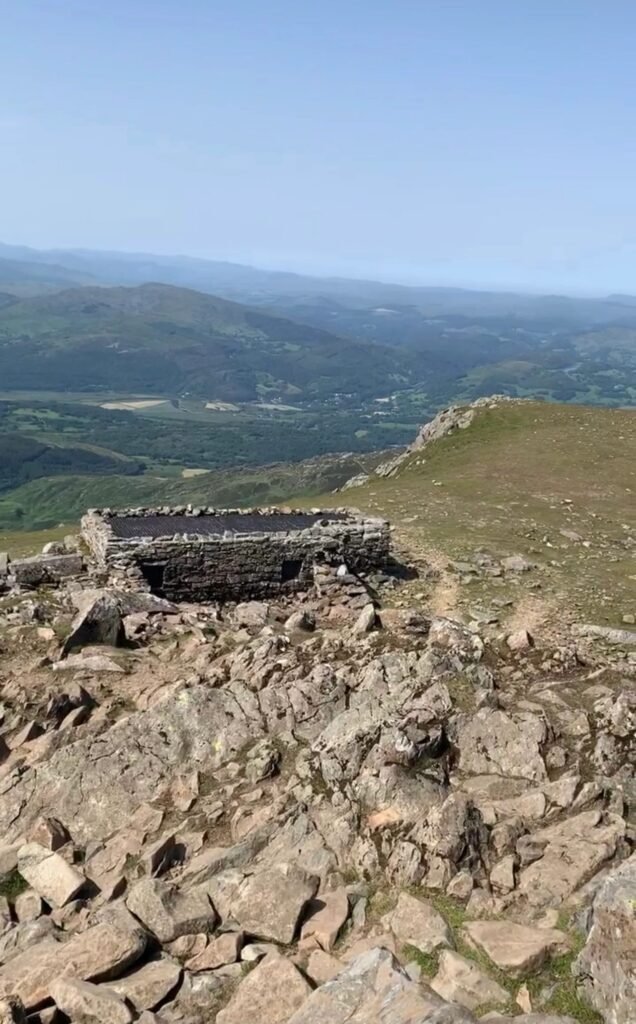

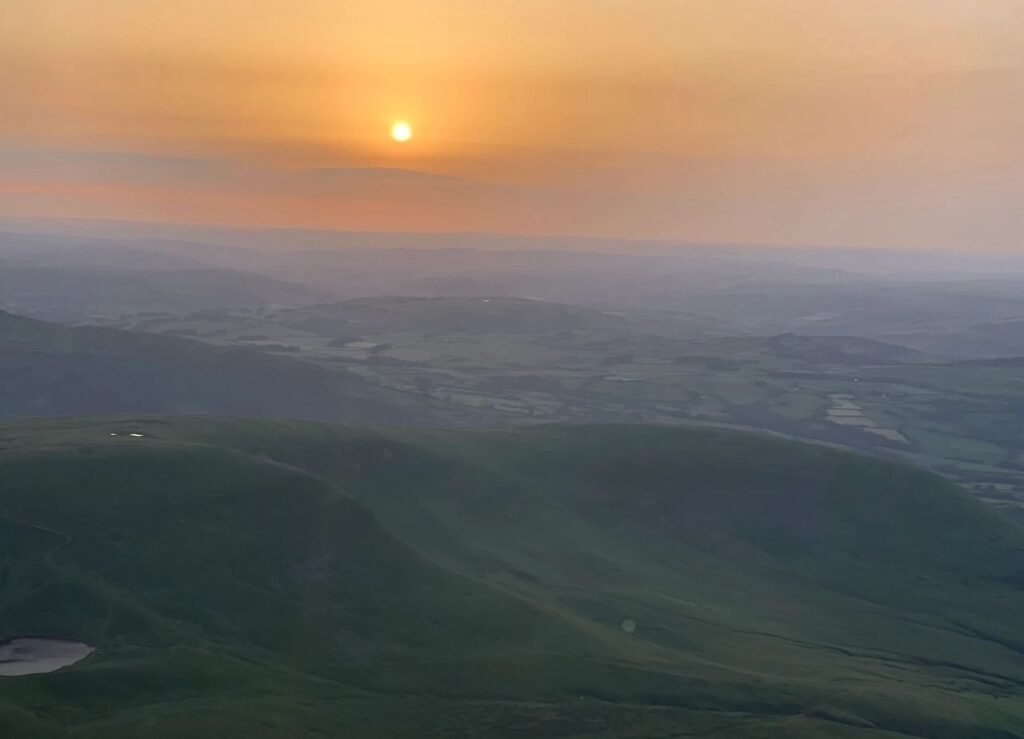
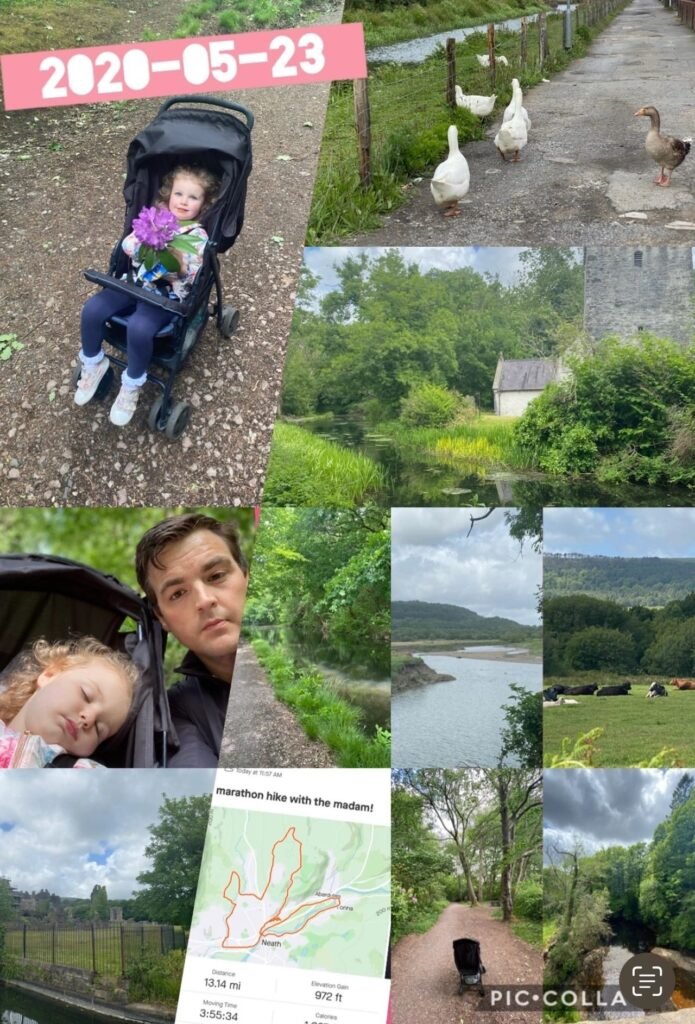
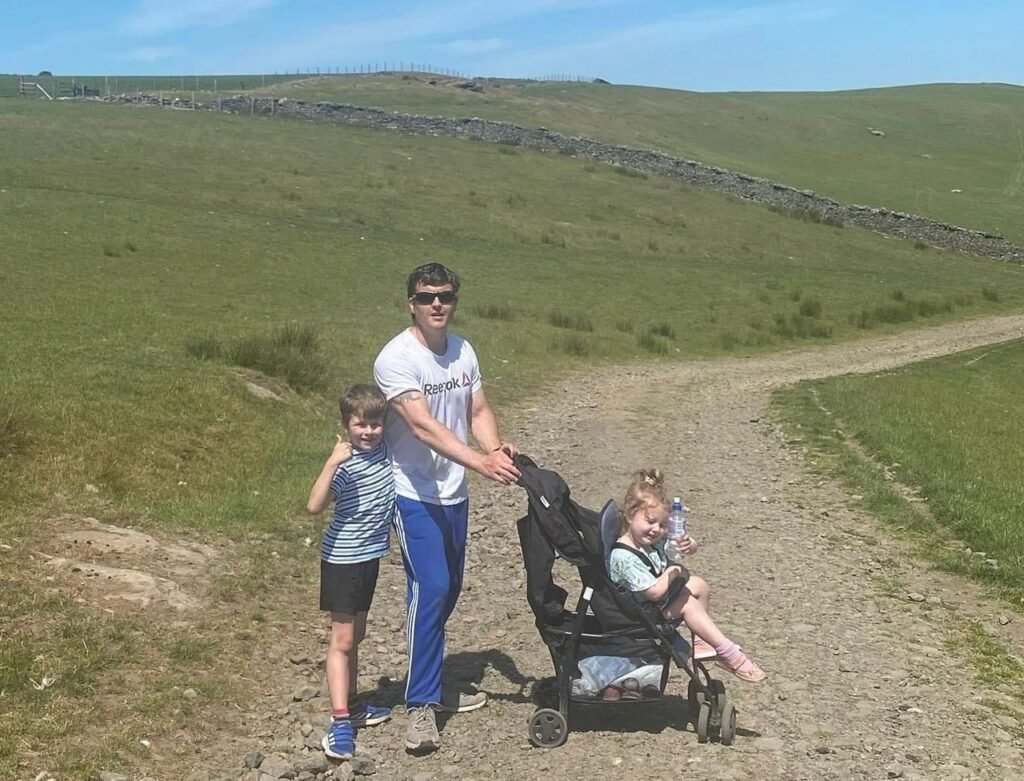

Closing Thoughts and Conclusion: Does Hiking Keep You Fit?
There you have it, an introduction to the world of hiking. Does hiking keep you fit? Absolutely. But it’s not just about the physical benefits or the memories gained along the way. Hiking has given me experiences—both family hikes and individual journeys—that I’ll treasure for a lifetime. The benefits of hiking are multi-faceted, and I’m certain you’ll feel the same once you give it a try.
As adults, we’re busy, and children often become overly stimulated with the array of technology at their fingertips. Sometimes, it’s nice to lace up, lock the door, and spend a few hours together on a technology-free family hike. It’s a perfect way to connect with nature, stay fit, and bond without distractions.
Looking ahead to Part 2, I’ll walk you through my exact training regime for ultra-endurance hikes and the events themselves. I had to adopt some rather unorthodox training sessions to balance my family and work commitments (thanks to a very patient wife!).
For now, I urge you to give hiking a go. Whether you’re wondering does hiking keep you fit or if you’ll love hiking as much as I do, I’m confident you’ll find it rewarding and a great contribution towards your fitness journey.
I’m currently planning another hiking ultra-endurance event and will be sure to keep you posted on my progress.
Lastly, thank you sincerely for reading this article. I aim to provide as much value as possible to you, the reader. I do my best to publish articles that cater to all ages, experiences, and genders, 2-3 times a week. If you enjoyed this, an email subscription to my website would mean the world to me—you’ll get notified the moment a new blog post is out.
Chat soon,
Matt


4 thoughts on “Does Hiking Keep You Fit? Find out why you’ll love hiking”
Comments are closed.